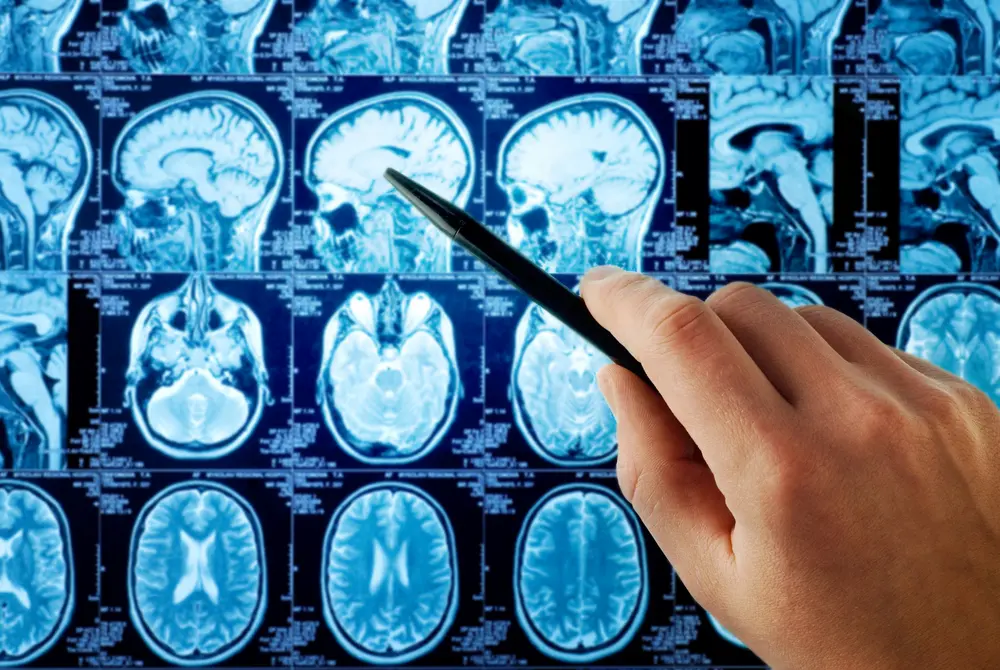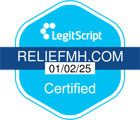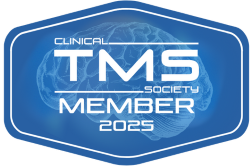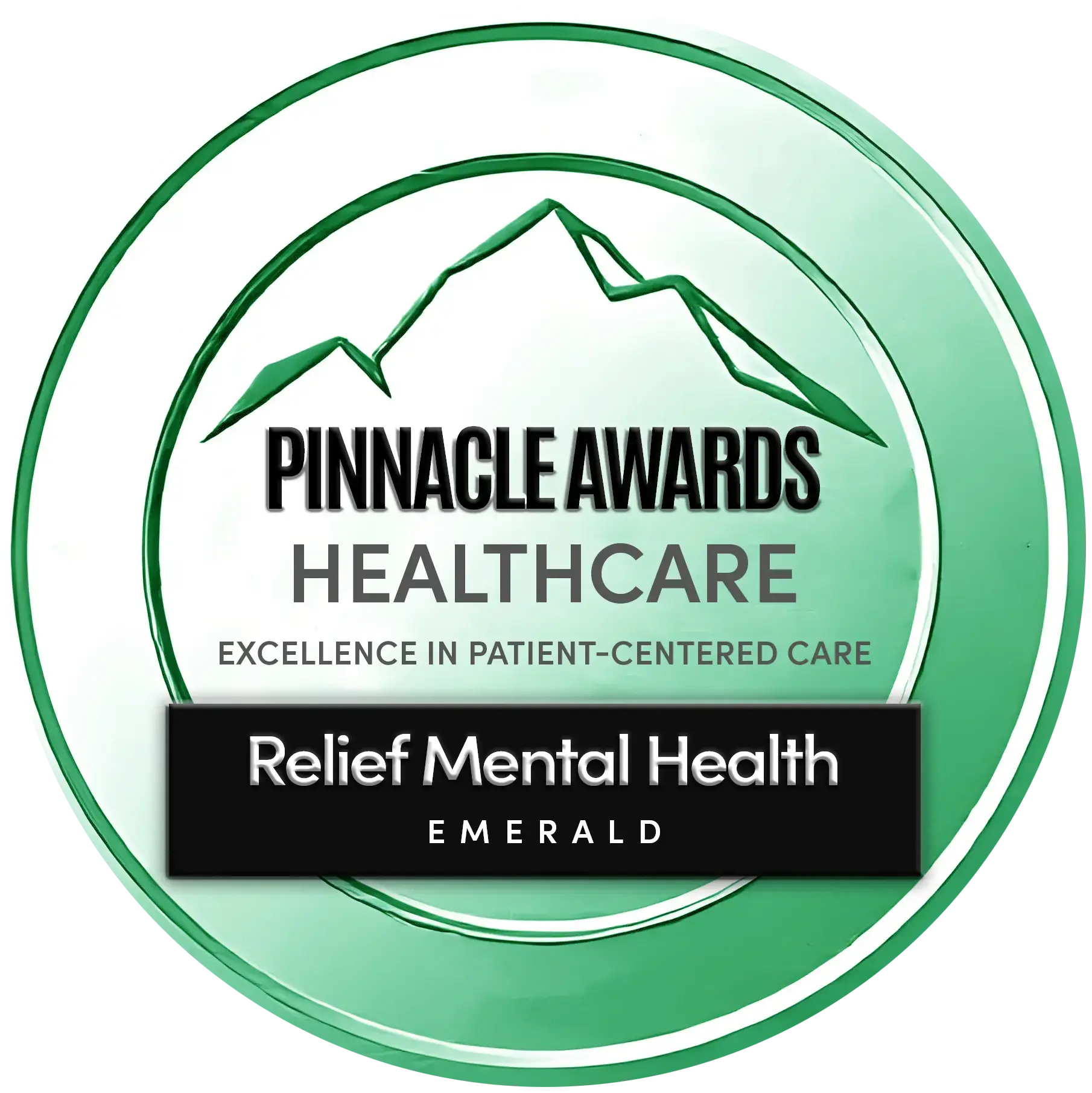
Evidence-based interventions, such as therapy and medication, show promising results either as single or adjunctive treatments for mental health diagnoses. However, these treatments are far from flawless, with research showing significant dropout rates and difficulties maintaining long-term positive outcomes. That’s why treatment providers are adopting innovations like TMS to enhance treatment efficacy.
Transcranial magnetic stimulation (TMS), and particularly Deep TMS™, represents a notable advancement in this regard. Its non-invasive nature and targeted approach have been shown to improve treatment adherence and sustain long-term positive outcomes for those struggling with a range of mental health diagnoses.
Understanding TMS in Mental Health Treatment
TMS is a revolutionary non-invasive treatment option that has gained recognition in recent years. Unlike traditional therapies that often rely on medications or talk therapy sessions, TMS uses an electromagnetic field to safely stimulate and regulate nerve cells in specific parts of the brain (particularly the prefrontal cortex) and ease depression symptoms. TMS pulses are often applied repetitively, hence the name repetitive TMS or rTMS.
Currently, two types of TMS are publicly available as a form of therapy: the standard rTMS and the more advanced Deep TMS. These two share some similarities but differ to an extent.
Similarities between Standard rTMS and Deep TMS
Both standard rTMS and Deep TMS (dTMS) use magnetic pulses to target brain structures linked to various mental health diagnoses. The repeated pulses help regulate neural activity in these areas, with dTMS reaching deeper brain regions for potentially greater impact, thereby reducing symptoms of treatment-resistant depression.
Safety and Efficacy
Both standard TMS and Deep TMS are safe and non-invasive. A 2007 randomized controlled study compared the safety of dTMS with standard TMS and sham treatment. The study found Deep TMS to be well tolerated, with no significant adverse physical or neurological effects, similar to the standard TMS and sham groups.
Effectiveness in Treating Mental Health Conditions
Both standard and Deep TMS have been shown to effectively alleviate mental health symptoms. A 2019 study in the Journal of Psychiatric Research on Major Depressive Disorder (MDD) found that combining either form of TMS with pharmacotherapy led to higher remission rates (of up to 60%) compared to pharmacotherapy alone (11%). Notably, response rates were significantly higher for Deep TMS combined with pharmacotherapy than for standard TMS combined with pharmacotherapy, highlighting the enhanced effectiveness of dTMS in treating MDD.
Differences Between Traditional rTMS and Deep TMS Treatments
While dTMS and rTMS share similarities, the two are different in the following ways:
Stimulation and Area of Targeting
The main difference between Traditional rTMS and Deep TMS lies in their equipment, technology, and the scope of magnetic activation. Traditional rTMS uses a figure-8 coil, which penetrates only 0.27 inches (0.7 cm) into the brain. In contrast, dTMS employs a 3D H-coil helmet that reaches deeper, up to 1.25 inches (3.2 cm), and covers a broader surface area.
The H-coil generates a large electric field that stimulates more neurons and reduces the chances of missing the target brain region. With standard TMS, even 1mm off in positioning can lead to a 40% loss of the required dosage. A 2014 brain stimulation study highlighted that the H-coil stimulates approximately 17 cm³ of brain matter, compared to the 3 cm³ stimulated by the figure-8 coil.
Other clinical studies confirm that Deep TMS is superior to Traditional TMS in treating depression. The response rate was significantly greater with dTMS plus medication (67%) than with standard rTMS plus medications (44%).
Superior Patient Comfort with Deep TMS
Traditional TMS requires the patient’s head to be immobilized in a specific chair, which can be uncomfortable and restrictive. Even slight movements can disrupt the treatment’s precision, potentially affecting its efficacy. However, Deep TMS has an innovative design that allows for flexibility.
Deep TMS is FDA Approved for More Than Depression
Traditional rTMS received FDA clearance for treating major depressive disorder (MDD) in 2008. Deep TMS, however, has broader FDA clearances: for MDD in 2013, obsessive-compulsive disorder (OCD) in 2018, smoking cessation in 2020, and anxious depression in 2022. Additionally, dTMS has received the European CE mark for treating numerous other diagnoses, including Alzheimer’s disease, memory loss, autism, bipolar disorder, chronic pain, multiple sclerosis, Parkinson’s disease, post-stroke rehabilitation, PTSD, and negative symptoms of schizophrenia.
Deep TMS is More Effective
Deep TMS’s wider magnetic field reduces the likelihood of missing relevant brain structures. The H-Coil is also safely secured in a helmet that sits on the patient’s head throughout treatment to minimize movement. These allow it to offer deep brain stimulation accurately and effectively. Traditional rTMS’s narrower field is more prone to targeting errors, potentially missing key areas necessary for effective treatment. Even in initial clinical trials, the efficacy levels of dTMS were about double those of rTMS. Deep TMS is an upgraded and updated version of the technology.
Deep TMS at Relief Mental Health
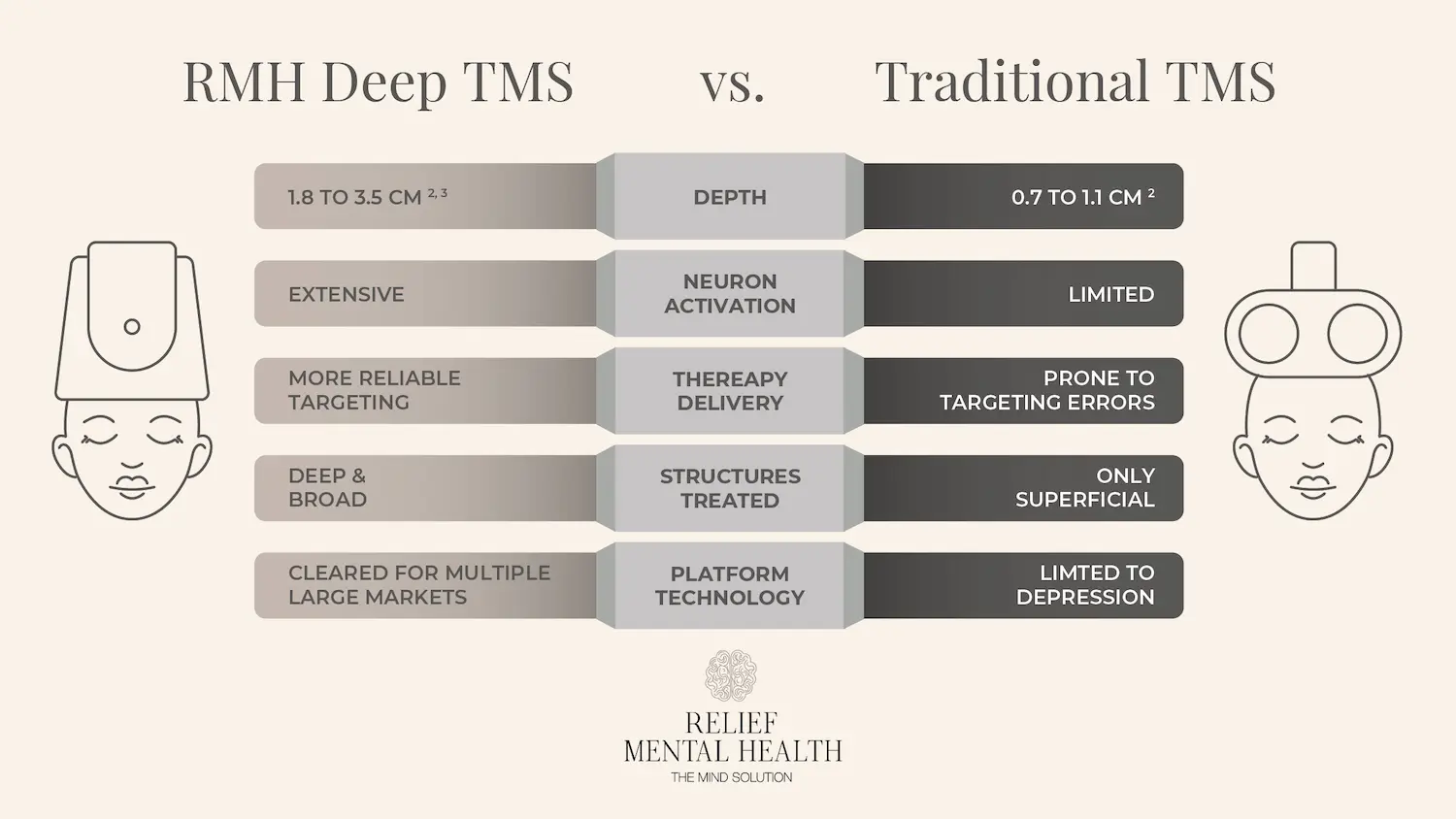
If you or someone you know is dealing with mental health diagnoses, Deep TMS could be the solution. This cutting-edge treatment targets deeper brain structures, offering a more effective approach than many traditional therapies.
At Relief Mental Health, we offer top-notch care and the latest in mental health treatments. Our expert team provides a comfortable and supportive environment. We’re here to help you benefit from the latest advancements.
Take the first step toward a brighter future with Deep TMS at Relief Mental Health. Our dedicated professionals are ready to support you on your journey to improved well-being. Schedule a consultation today to see how Deep TMS can make a difference in your life. Contact us now to learn more and book your appointment. We are committed to helping you find relief.
